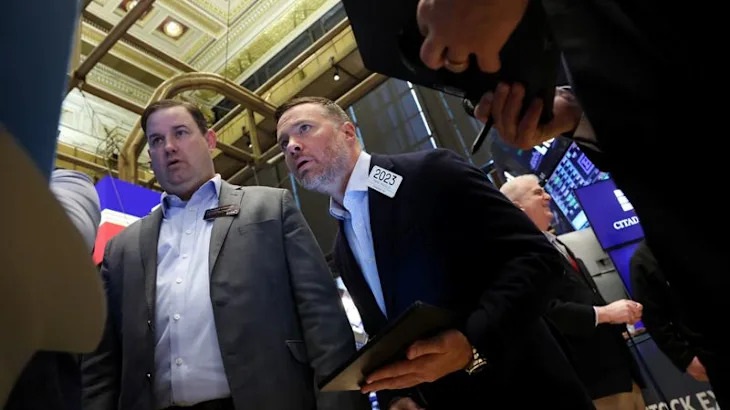
S&P 500 hits lowest close in almost a year as hopes wane for tariff concessions
By Sinéad Carew and Shashwat Chauhan
(Reuters) -The S&P 500 sold off sharply on Tuesday to close below 5,000 points for the first time in almost a year after it reversed a strong morning rally, while investor hopes faded for any imminent U.S. delays or concessions on tariffs ahead of a midnight deadline.
The S&P 500 has lost $5.83 trillion in market value, for its steepest four days of losses since the index was created in the 1950s, following President Donald Trump unveiling of hefty global tariffs against U.S. trading partners late on Wednesday.
The index's more than 12% decline since the announcement is its biggest consecutive four-day percentage since the COVID pandemic, according to LSEG data.
The S&P had risen more than 4% earlier on Tuesday as investors hoped that Trump would soften his stance or postpone a Wednesday deadline for tariffs.
But White House press secretary Karoline Leavitt said on Tuesday afternoon that Trump expects tariffs will go into effect even though she said nearly 70 countries reached out looking to begin negotiations to reduce the impact of U.S. trade policies.
Market participants "were optimistic this morning that we would get some sort of sign that we're moving closer to a deal or a compromise with some of these bigger countries or that there would be a delay coming given that so many people wanted to negotiate," said Lindsey Bell, chief market strategist at Clearnomics in New York.
"That doesn't seem to necessarily be the case as we are quickly approaching the midnight deadline and investors are losing confidence."
The White House said on Tuesday afternoon that it expects 104% tariffs on China to go into effect on Wednesday.
This was after China said earlier it will never accept the "blackmail nature" of Trump's threat to ratchet up tariffs on Chinese imports to more than 100%.
And United States Trade Representative Jamieson Greer said on Tuesday that exemptions to the global tariffs are not expected in the near term.
"People wanted to be optimistic and eventually realized they didn't have a good reason," Melissa Brown, managing director, investment decision research at SimCorp.
"Earnings are going to start to be reported in the next few days. Even if earnings in the first quarter aren't down badly, we're going to see a lot of language from companies about the expected impact from the tariffs."
Quarterly earnings season will kick off later this week, with JPMorgan, Morgan Stanley and Wells Fargo set to report on Friday.